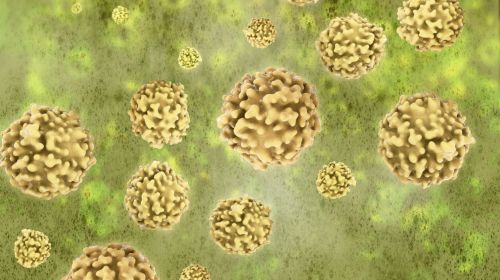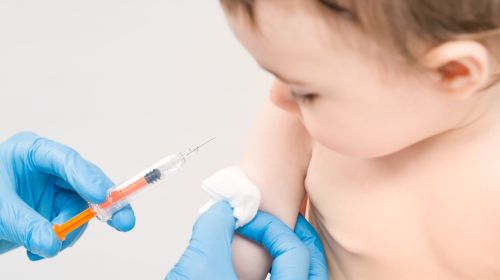HPV infections usually heal on their own, but they can also lead to genital warts and cervical cancer. What protects against HPV infection and its consequences.
- Vaccination against HPV can protect against cervical cancer.
- © iStock.com/Foremniakowski
Human papillomavirus (HPV) infect human skin or mucous membrane cells. There are over 200 different types of HPV. Some mainly affect the genital area: low-risk types such as HPV 6 and 11 cause genital warts (also called genital warts or condylomata acuminata), high-risk HPV types such as HPV 16 and 18 can cause cancer.
Article content at a glance:
How common is HPV?
Most people become infected with human papillomavirus at least once in their life. The viruses are transmitted from person to person through direct skin and mucous membrane contact.
Risk factors for genital infection include:
- high number of sexual partners
- homosexual sexual contacts
- Oral and anal intercourse
- immunodeficiency
Since transmission is also possible through very close body contact, the use of a condom does not reliably protect against infection.
The body's immune system can successfully fight most infections – after about one to two years the viruses can no longer be detected. In Germany, genital warts develop in around 1.2 percent of sexually active adults between the ages of 15 and 49. HPV-related cancers are diagnosed in around 6,250 women and 1,600 men each year, according to the cancer registry.
Symptoms of HPV infection
Some human papillomaviruses can cause common skin warts (verrucae). These harmless warts often appear on the hands and feet, as well as the face. Cosmetically, they are often perceived as annoying by those affected.
HPV infections in the genital area are usually asymptomatic, which means that there are no symptoms whatsoever and those affected do not notice the infection.
If an infection with a low-risk HPV type persists, genital warts can develop. A long-standing infection with a high-risk HPV type can lead to precancerous stages and ultimately cancer. Since these infections do not cause any symptoms at first, cancer screening tests are important.
What types of cancer are caused by HPV?
HPV causes nearly 100 percent of all cervical cancer cases. The viruses are also responsible for tumors in the vagina and vulva in women. In men, human papilloma viruses can cause penile cancer. Tumors in the mouth, throat, and anal area caused by HPV, such as larynx cancer, are found in both sexes.
How cervical cancer develops
In about ten percent of all women infected with high-risk HPV types, the infection does not heal on its own. After a few years, those affected may experience cell changes in the area of the cervix. Doctors distinguish between three stages:
• Stage 1: slight cell changes, which often resolve on their own
• Stage 2: Moderate cell changes, spontaneous healing are less common than in stage 1
• Stage 3: advanced cancer, removal of the affected area is recommended
On average, it takes about three to six years between the infection and the presence of an advanced precancerous stage. Without treatment, this precancerous stage can develop into cervical cancer after about ten to 30 years. However, if women have regular cancer screening examinations, the cell changes can be detected early and usually treated successfully.
Prevention: early detection of cervical cancer
In Germany, gynecologists conduct a free cancer screening test for women over the age of 20 once a year – from 35 every three years – for the early detection of cervical cancer. The so-called Pap test is a cell swab from the cervix. When the smear is examined in the laboratory, changes in the human cells caused by the papilloma virus are detected.
The Pap test can give five different results:
• PAP I: normal results
• Pap II: slight cell changes but no suspicion of precancerous lesions or cancer
• Pap III: unclear finding, the cause of which cannot be determined without further investigation
• Pap IV: Pre-cancerous, early-stage cancer, or cancer possible; further investigation needed
• Pap V: a cancer diagnosis is very likely
You can find more important information about the Pap test in this article.
As a further examination, doctors can perform a vaginal examination (colposcopy) on the affected women: They look at the vagina and cervix with a kind of magnifying glass and can also see small changes in the mucous membrane. During the vaginal examination, a tissue sample can also be taken, which is then examined in the laboratory for the presence of cancer or precancerous lesions.
HPV test: when does it make sense?
The HPV test can detect DNA (genetic material) of the HPV virus and thus an infection with HPV. However, cancer or precancerous stages are not detected by this test. Since young women are often only temporarily infected with HPV, it is not considered useful to carry out an HPV test for cancer prevention in women under 30 years of age. For women aged 35 and over, a combination of Pap test and HPV test is offered every three years as part of preventive care.
What therapy options are there for HPV infections?
The HPV infection itself cannot be treated, but the clinical pictures caused by the viruses can. Various therapy options are available for skin and genital warts, such as the use of special active ingredients or surgical removal. In the case of genital warts, it is important that the sexual partners of those affected also have themselves examined and, if necessary, treated.
Treatment for cancers caused by HPV depends on the type and severity of the cancer. Radiation therapy, chemotherapy or surgical methods are used. Cancer precursors on the cervix are usually removed by a so-called conization (a conical cutout of the affected area on the cervix).
What are the chances of recovery from diseases caused by HPV?
Genital warts are usually treatable. However, many sufferers have their warts reappear after a few months because the HPV infection itself is not eliminated by the therapy. Therefore, regular follow-up checks are useful even after the end of therapy. Skin warts caused by HPV often go away on their own. In order to avoid spreading them to other people, therapy is still recommended.
The prognosis for cancers caused by HPV depends on the type of tumor and the stage at which it is diagnosed. In general, cancers discovered at an earlier stage have a better chance of being cured.
HPV vaccination can protect against infection
The HPV vaccination prevents infection with the most dangerous types of HPV and thus lowers the risk of developing cancers caused by HPV. The vaccines currently available in Germany are considered safe and have only a low rate of side effects.
The vaccination should preferably take place before the first sexual intercourse. It is not yet known how long the protection against HPV acquired by a vaccination lasts. Data to date indicate long-term vaccination protection.
You can read the answers to the most important questions about HPV vaccination here.



